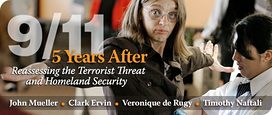It is noteworthy that neither John, nor Veronique, nor Tim has yet engaged my fundamental point, while it seems to me that I have engaged theirs. Of course, we can’t protect ourselves against every conceivable threat. We don’t have the resources or imagination to do that. Yes, a balance must be struck between security and liberty such that our liberties are encroached on as minimally as possible to yield the maximum possible increase in security. Certainly, politics is often played when it comes to security measures. Our policymakers should be more proactive than reactive. Rapacious contractors and their lobbyists can and do exploit our security vulnerabilities to win fat contracts and earn huge fees. And, definitely, the odds of being killed by terrorists are very low.
But, intelligence establishes that Al Qaeda and its acolytes remain determined to attack us again. Given the huge number of potential targets and the huge number of security gaps that yet remain, terrorists are more than capable of pulling off another devastating attack, and perhaps even a more devastating one (if weapons of mass destruction were acquired). And, though the odds of being killed by a terrorist are low, the consequences of another terror attack would be significantly greater than the consequences of the same number of people being killed in another fashion.
While what I did say has gone unanswered, what I didn’t has been refuted. I didn’t say anything about the Cold War in my initial post, Tim, but now that you mention it, let’s talk about it.
Reasonable minds can differ about why, exactly, we won the Cold War. I’m of the view that it is as likely as not that we won because we took the threat of communism seriously and the Soviets ultimately couldn’t keep pace with our defensive expenditures. No less an authority on the subject than Mikhail Gorbachev has said as much. To the extent that there are any similarities between the communists and the Islamic fundamentalist terrorists, this argues for more defenses and greater expenditures rather than fewer.
But, there’s a fundamental difference between the communists and the terrorists. Sure, the formers were fanatical, but they weren’t “nuts” about it. That is to say, there was a line beyond which the communists, being rational and temporally oriented, were unwilling to cross. The doctrine of mutual assured destruction kept the communists (and us) in our respective boxes. Today’s terrorists, on the other hand, are not just willing to die for their cause; they are eager to. This argues for taking the threat from them even more seriously than we took the threat from communists.
Also, Tim misconstrues what I said about the existence (or lack thereof) of God. It wasn’t a point about religious faith, really. It was what’s called an “analogy.” I was simply making the point that it’s less dangerous to take the terrorists seriously than it is to take them lightly, just as it’s less dangerous to believe in God and act accordingly in case there really is one. It’s really a point about risk and the prudent management of it. That, surely, is what security is all about.

